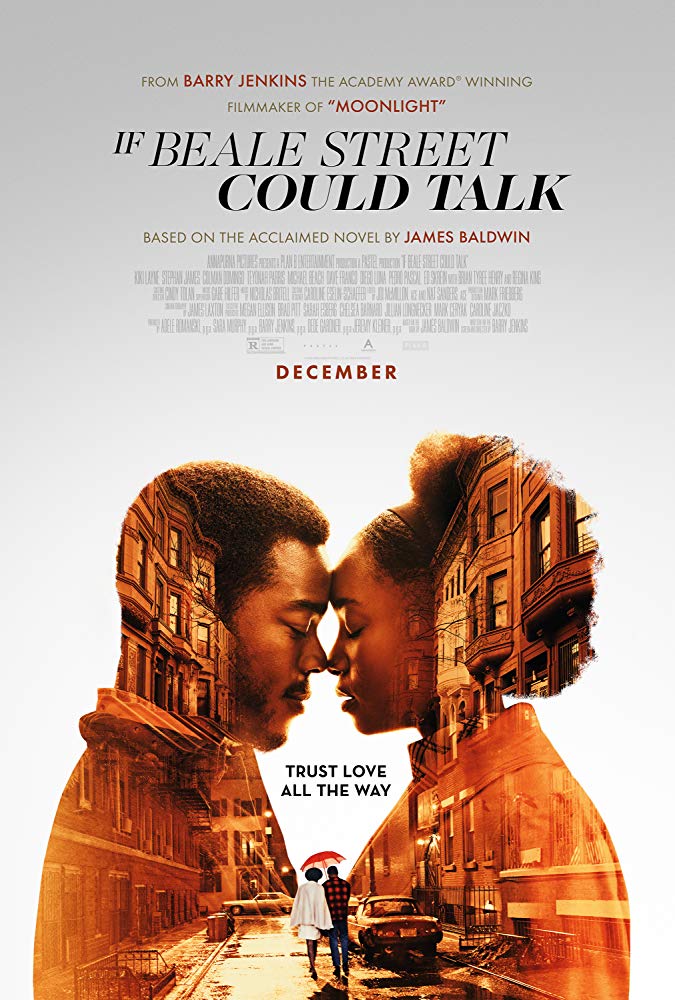If Beale Street Could Talk (2018)


SHOULD I SEE IT?
YES
Barry Jenkins follows up his Best Picture winner Moonlight, with this beautiful and bittersweet romantic drama, which stands as one of 2018’s finest films.
Regina King’s performance, which has earned several Best Supporting Actress prizes, leads a brilliant ensemble, who never hit a false beat.
Jenkins’ distinctive vision, coupled with James Baldwin’s written words, creates an immersive experience, beautifully shot, scored, and designed.
NO
Jenkins’ approach to telling stories does not work for everyone, and for those who could not get into Moonlight, with non-linear storytelling and measured pacing, If Beale Street Could Talk could cause the same reaction.
May appear to be more style than substance to some viewers.
I got nothing. I love this film. It stands tall in a crowd of impressive movies from 2018 detailing stories of African-American culture and life, and the film’s restraint is dealing with emotional subject matter is admirable and deserves to be seen.
OUR REVIEW
After delivering one of the decade’s most powerful and meaningful films, the groundbreaking Oscar-winning drama Moonlight in 2016, writer/director Barry Jenkins avoided the big money project and stayed true to himself as an artist and storyteller, pursuing the adaptation of a story he has wanted to tell for a long, long time.
James Baldwin’s If Beale Street Could Talk.
Published in 1974, Baldwin’s novel told the story of a young African-American couple, Tish and Fonny, expecting their first child but seeing their family broken apart when Fonny is falsely accused of rape and sent to jail.
Baldwin’s novel confronts perceptions and realities of incarceration among black men, as well as the impact frequent separation of families in the black community has on generations of families.
Under the direction of Jenkins, If Beale Street Could Talk, has a bittersweet, poetic nature about it, whether we hear Tish (KiKi Layne) reciting Baldwin’s prose in voiceover, or the measured and steady way which Jenkins weaves Baldwin’s words into his adapted screenplay, providing us an overall sense of the totality of what Tish and Fonny suddenly must face in front of them.
Told in a non-linear format, Jenkins shows us how Tish and Fonny meet, fall in love, and reveals the chasm which exists between both families. The film’s slower, deliberate pace, coupled with arresting visuals from cinematographer James Laxton, and a remarkable score from Nicholas Britell, creates a world that is as inviting as it can be intimidating. Awash in gold and amber hues, Jenkins orchestrates the score, the visuals, and a mix of his and Baldwin’s words into an inclusive and stunning cinematic experience.
Drawing us in, we see people functioning, but also surviving. Fonny’s false arrest is jarring because not only is he a good man with his whole life ahead of him, but in a snap of the fingers, or even with the most sketchy of allegations, his freedom can just as easily be over. Tension hovers around the perimeter of nearly every scene.

With Tish and Fonny becoming pregnant, one of the year’s finest scenes comes when the two families agree to meet and Tish decides to break the news to Fonny’s family. Fearful that she is not viewed as “good enough” for them, worst fears are realized when Fonny’s mother (Aunjanue Ellis) fires off a vitriolic condemnation in Tish’s own living room. Jenkins masterfully builds the emotion, until a further, unexpected moment forces the women to take control of the conversation, the room, the house, and the issues between the families.
And I would be remiss to not mention Regina King, whose performance as Sharon, Tish’s mother, ranks as among the finest performances of 2018. Supportive, protective, and willing to do whatever she can to help Tish and Fonny begin their family without separation, Jenkins deploys her effectively throughout the movie. In each moment, King becomes a focal point for us to root for; an extended hand we wish we could offer to this young couple to help them come through the darkness they are in, and emerge into the light of a brighter day.
Jenkins has now crafted two films, back-to-back, which tackle societal issues through keen, quiet observation. Sure, he could go all provocative and bullhorn his messages, but Jenkins wants to explore how his characters respond to challenges and conflict.
Whether it is Chiron hiding his homosexuality for much of his life out of fear of being seen, or Tish and her family doing whatever they can to free Fonny from jail, we ride the emotional journey with Jenkins. He makes us care about his people, his characters, his subjects, and here, like in Moonlight, love lies at the heart of everything we see, feel, and hear.
Never preachy, Jenkins’ restraint as a filmmaker is astonishing at times, he funnels through Baldwin’s text to give us a far-ranging snapshot of black culture, commensurate to the time period, but still relevant to this day.
Baldwin once wrote, “Not everything that is faced can be changed, but nothing can be changed until it is faced.”
The principal characters of If Beale Street Could Talk are ready to face what is in front of them. We learn from their resilience, admire their pride, and cannot help but think of all the Tishes and Fonnys in the world who were cast aside and forgotten.
CAST & CREW
Starring: KiKi Layne, Stephan James, Regina King, Colman Domingo, Teyonah Parris, Brian Tyree Henry, Michael Beach, Aunjanue Ellis, Diego Luna, Finn Wittrock, Ed Skrein,, Dave Franco, Ebony Obsidian.
Director: Barry Jenkins
Written by: Barry Jenkins
Adapted from the novel “If Beale Street Could Talk” by James Baldwin
Release Date: December 14, 2018
Annapurna Pictures
